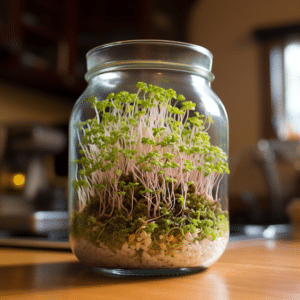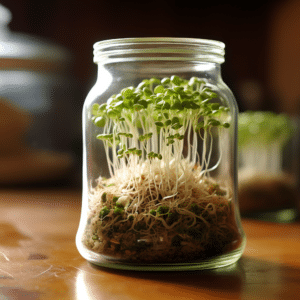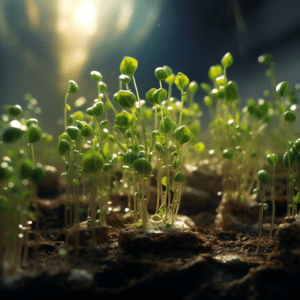Growing sprouts in a jar is a simple, cost-effective method to cultivate your own fresh and nutritious greens. This process, known as sprouting, can be done in your own kitchen with minimal equipment. In this guide, we will explore the steps and tips to successfully grow sprouts in a jar.
Understanding Sprouts and Their Benefits

Sprouts are germinated seeds that have begun to grow. They are packed with nutrients and can be used in a variety of dishes, from salads to sandwiches. The sprouting process increases the bioavailability of nutrients, making sprouts a healthy addition to any diet.
Aside from their nutritional benefits, sprouts are also easy to grow and require little space. This makes them an excellent choice for urban dwellers or those with limited gardening space.
The Nutritional Value of Sprouts
Sprouts are rich in vitamins, minerals, antioxidants, and enzymes that can help boost your health. They are particularly high in Vitamin C, B vitamins, and essential amino acids. Additionally, sprouts are a good source of dietary fiber, which aids in digestion.
Furthermore, sprouts contain lower amounts of calories and carbohydrates compared to fully-grown vegetables, making them a great choice for those watching their weight.
Choosing the Right Seeds for Sprouting
When it comes to sprouting, not all seeds are created equal. Some seeds sprout more easily than others, and different seeds produce sprouts with varying flavors and textures. It’s important to choose seeds that are specifically labeled for sprouting, as these have been properly cleaned and are free from harmful bacteria.
Popular choices for sprouting include alfalfa, mung beans, lentils, radish, and broccoli. Each of these seeds offers a unique flavor profile and nutritional benefits.
Alfalfa Sprouts
Alfalfa sprouts are one of the most common types of sprouts. They are crisp, mild in flavor, and packed with nutrients. Alfalfa sprouts are a great source of Vitamin K, which is essential for blood clotting and bone health.
These sprouts are also rich in phytochemicals, which are plant compounds that have been shown to have anti-inflammatory and antioxidant effects.
Mung Bean Sprouts
Mung bean sprouts are another popular choice for sprouting. They have a slightly sweet, nutty flavor and a crunchy texture. Mung bean sprouts are a good source of protein and dietary fiber, making them a filling and nutritious addition to meals.
Additionally, mung bean sprouts are rich in folate, a B-vitamin that is essential for DNA synthesis and cell division.
Steps to Grow Sprouts in a Jar

Now that we’ve covered the basics of sprouts and their benefits, let’s dive into the step-by-step process of growing sprouts in a jar.
Materials Needed
- A clean, wide-mouth glass jar
- Sprouting seeds
- A sprouting lid or cheesecloth and a rubber band
- Water
Step 1: Soaking the Seeds
The first step in the sprouting process is to soak your seeds. This helps to soften the seed coat and kickstart the germination process. To do this, place your seeds in your jar and cover them with plenty of water. The amount of soaking time varies depending on the type of seed, but generally, overnight soaking is sufficient.
Step 2: Draining and Rinsing the Seeds
After soaking, drain the water from the jar using your sprouting lid or cheesecloth. Rinse the seeds thoroughly with fresh water, then drain again. It’s important to ensure that the seeds are well-drained, as excess water can lead to mold growth.
Step 3: The Sprouting Process
Place the jar in a location that is out of direct sunlight but still gets good air circulation. Rinse and drain the seeds twice a day, every day, until your sprouts are ready. Depending on the type of seed, this can take anywhere from 3 to 7 days.
Step 4: Harvesting and Storing Your Sprouts
Once your sprouts have reached the desired length, it’s time to harvest. Rinse the sprouts one final time, then drain thoroughly. Sprouts can be stored in the refrigerator for up to a week. To maximize their shelf life, ensure they are completely dry before storing.
Common Issues and Solutions

While growing sprouts in a jar is generally straightforward, you may encounter a few issues along the way. Here are some common problems and their solutions.
Mold Growth
Mold is a common issue when sprouting seeds. This is often due to poor air circulation or excess moisture. To prevent mold, ensure your seeds are well-drained and your jar is placed in a location with good air flow. If you notice mold on your sprouts, it’s best to discard them and start fresh.
Slow Germination
If your seeds are taking a long time to sprout, it could be due to a number of factors. The seeds may be old or of poor quality, or they may not have been soaked long enough. Ensure you are using fresh, high-quality seeds and soaking them for the recommended amount of time.
Conclusion
Growing sprouts in a jar is a simple and rewarding process. With a little time and care, you can cultivate your own nutritious sprouts right in your kitchen. Whether you’re a seasoned gardener or a sprouting novice, this guide has provided you with the knowledge and steps to successfully grow sprouts in a jar.
